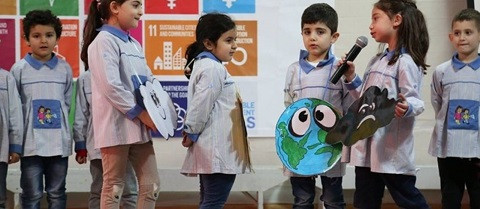
GCED Basic Search Form
Quick Search
You are here
News

UNESCO’s Associated Schools Network are successfully integrating sustainable development into government policy, and scaling up programmes to reach more schools, according to new results mapping from 37 countries.
Education for Sustainable Development is at the heart of UNESCO’s Associated Schools Network’s (ASPnet) work, and National Coordinatiors are sharing experiences on how their programmes have been upscaled and worked into policy.
“These inspiring examples will be instrumental as we move forward with the design of implementation strategies for ESD for 2030.” said Alexander Leicht, Chief of the Section of Education for Sustainable Development.
In a success story shared by Argentinian coordinators, schools within the Network collaborated on projects with local Biosphere Reserves, including the creation of a greenhouses and preservation of natural plants. These activities were upscaled, and will be replicated in other schools close to Biosphere Reserves with the support of the National Commission for UNESCO and the Ministry of Environment and Sustainable Development.
In Germany, several ASPnet schools and Teacher Education Institutions have been part of activities and model projects to strengthen ESD and the Whole Institution Approach on the level of their region or municipality. Some of these projects have been funded by the German Federal Ministry for Economic Cooperation and Development or the ministries of the federal states.
Ministry officials from the Republic of Zimbabwe gathered at Sihlengeni Primary School, who won the 2017 ESD Prize in Permaculture and encouraged other schools to implement similar projects.
In Japan, the Ministry of Education, Culture, Sports, Science and Technology (MEXT) and the National Commission for UNESCO are widely disseminating good practice in ESD implemented by ASPnet through guidelines which target any teachers or education stakeholders who are concerned with ESD implementation. ESD has been incorporated into Course of study for kindergartens and National Curriculum Standards for elementary and middle schools and high schools, and teachers need to get inspired.
In Bahrain, public and private partners are supporting a number of projects implemented by the ASPnet schools. A pedagogical kit was developed and presented to the Curriculum Department of the Ministry of Education in the Kingdom of Bahrain for wider dissemination among schools.
“It is interesting to see that many countries influenced policy through compiling good practices and sharing them with the Ministry of Education, Local or Municipalities government,” said Julie Saito, Chief of UNESCO’s Associated Schools Network.
Other examples reported were organizing school visits by government officials and presenting activities through social and traditional media or at national and international events. Many schools scaled up programmes by collaborating within UNESCO and other networks, and sharing good practices with non-ASPnet schools.
Some of the challenges recognized by ASPnet members included the need for more funding and resources for programmes, high turnover of school staff and keeping schools motivated. Managing the growth of the network and ensuring high quality standards at the same time was also cited as a challenge.
An opportunity identified was more connection and exchange within the network, for example, to share successes. Greater capacity building, training of trainers and knowledge sharing were also identified as potentially effective levers to fully mobilize ASPnet as advocator of ESD.
UNESCO calls on more ASPnet National Coordinators from around the world to share their experiences with ESD. These contributions will be essential to upscaling ESD in the next decade, allowing more learners to acquire the knowledge, skills, values and attitudes that lead to more sustainable societies.
Education for Sustainable Development (ESD) empowers learners to change the way they think and to act for a sustainable future. It has gained recognition as an integral element of quality education by schools around the world. In November 2019, UNESCO’s commitment to ESD was reinforced by the 40th session of UNESCO General Conference, which adopted a new global framework on ESD called ‘Education for Sustainable Development: Towards achieving the SDGs’ or ‘ESD for 2030’. UNESCO’s Associated Schools Network (ASPnet) is considered a key platform for further implementing ESD. ESD is identified as a priority in the ASPnet Strategy for 2014-2021.
Through its Associated Schools Network (ASPnet), UNESCO supported schools to adopt a “Whole-Institution Approach to Climate Action”. In a pilot project from 2016 to 2018, 258 schools in 25 countries integrated sustainability in every dimension of their school in a combination of learning and actions, involving 230 980 students and 13 853 teachers as well as their communities. In 2020, ASPnet will invite all of its member institutions – 11 500 schools in 180 countries – to adopt the whole-institution approach and develop and implement school action plans to counter climate change at the local level, with the objective to initiate lasting positive transformations in students’ attitudes, behaviours and actions.
URL:
